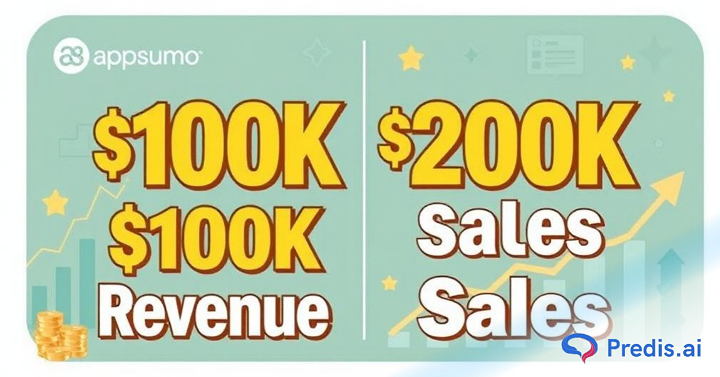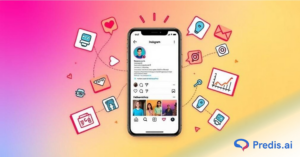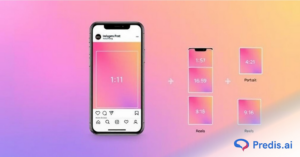We have been working on Predis.ai for more than a year now. After launching the first version in mid-April 2021, we pivoted the product and launched the content generator AI which we have today. The AI Content Generator was launched on 25th Oct 2021 and we cut it a bit close by launching our AppSumo Deal on 30th Oct 2021 – just before the BFCM mania. However, it did end up well with us selling more than $200K worth of Deals on Appsumo and making $100K revenue for us.
This is about our Appsumo Campaign learnings – and our suggestions on how to do an LTD! Why are we doing this – We hope someone will benefit from this!
First – here are the Real deal numbers and the screenshots from our Appsumo Deal page!
| Deal Type | Codes Sold | Our Revenue | Our Cut | Total Sales | AppSumo Part |
| Marketplace | 1488 | $68,885 | 60% | $114,808 | $45,923 |
| Plus Exclusive | 1495 | $33,408 | 40% | $83,520 | $50,112 |
| 2983 | $102,293 | $198,328 | $96,035 |
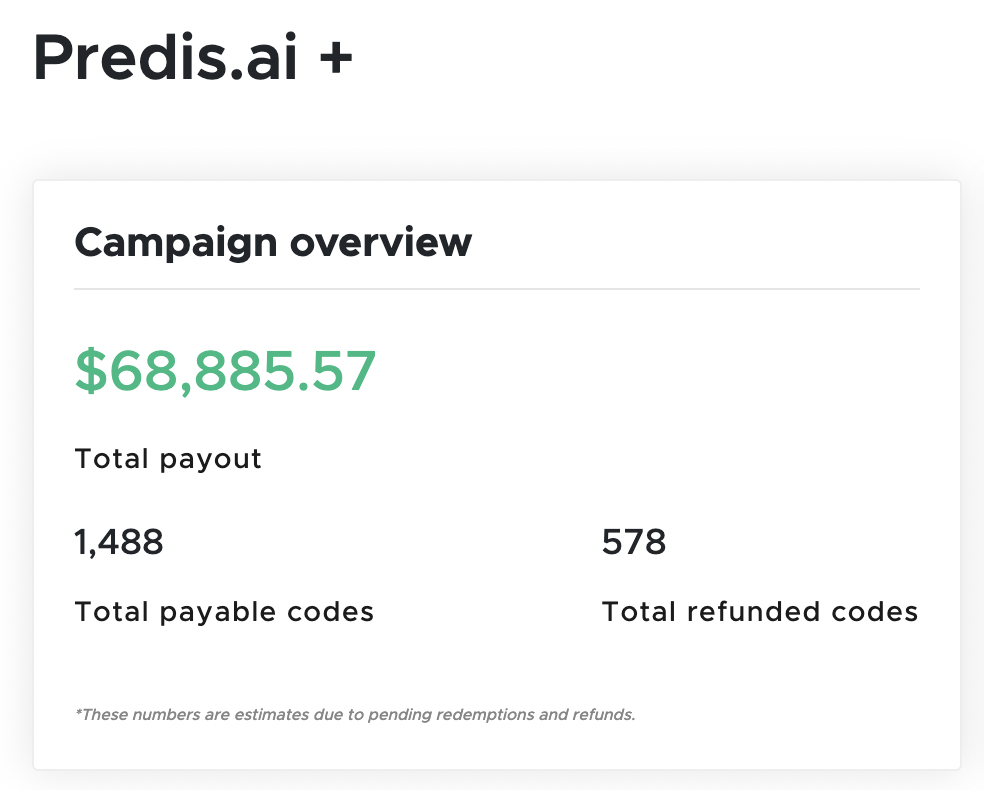
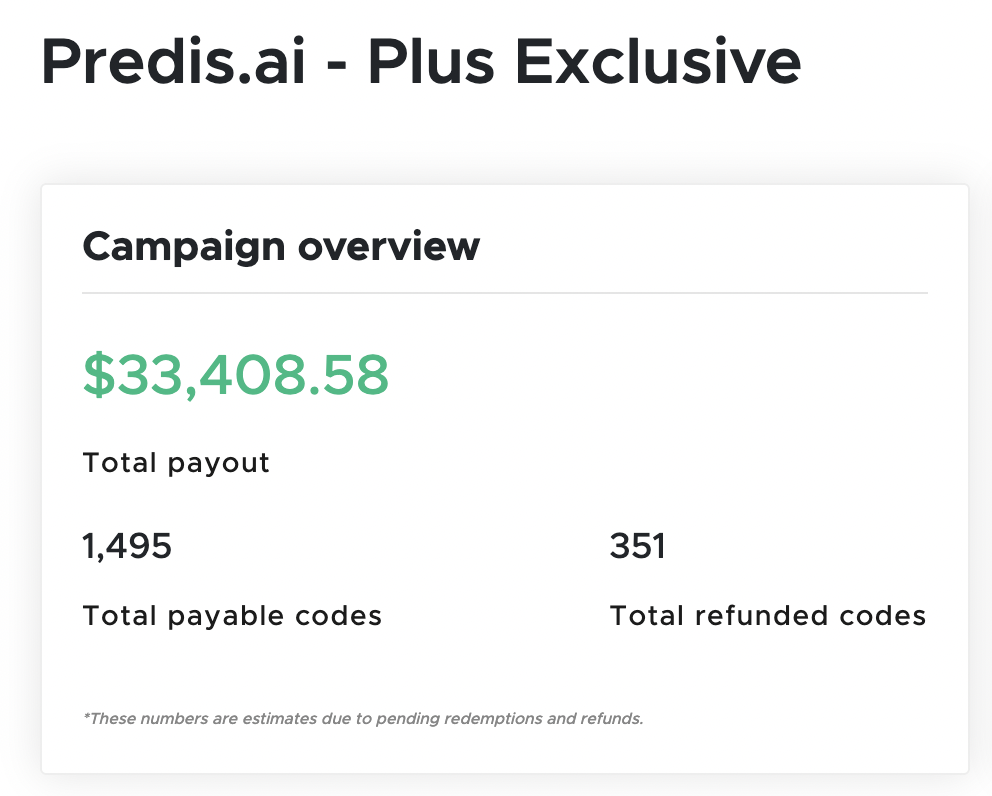
1. What is LTD
Everyone who does not know what is an LTD – LTD stands for Life Time deal and has become a very popular concept. A Lifetime deal is a special type of deal where you buy access/usage rights to a SAAS product for “Lifetime” at a one-time fee. However counterintuitive it may sound, it’s definitely the rage among both SAAS founders and End-users! The popular LTD site AppSumo does a GMV of more than $90M by selling LTDs. Considering the average deal size is $50 per code, That’s a lot of LTD software being sold for sure.
The typical Lifetime deal users are Solopreneurs, Digital Marketing Agency owners/employees, and Marketers. So if you are launching a product and are looking to sell to them, you should definitely look at Appsumo. Appsumo has a lot of good quality traffic of folks looking to try out new stuff and looking for some nice LTD bargains!
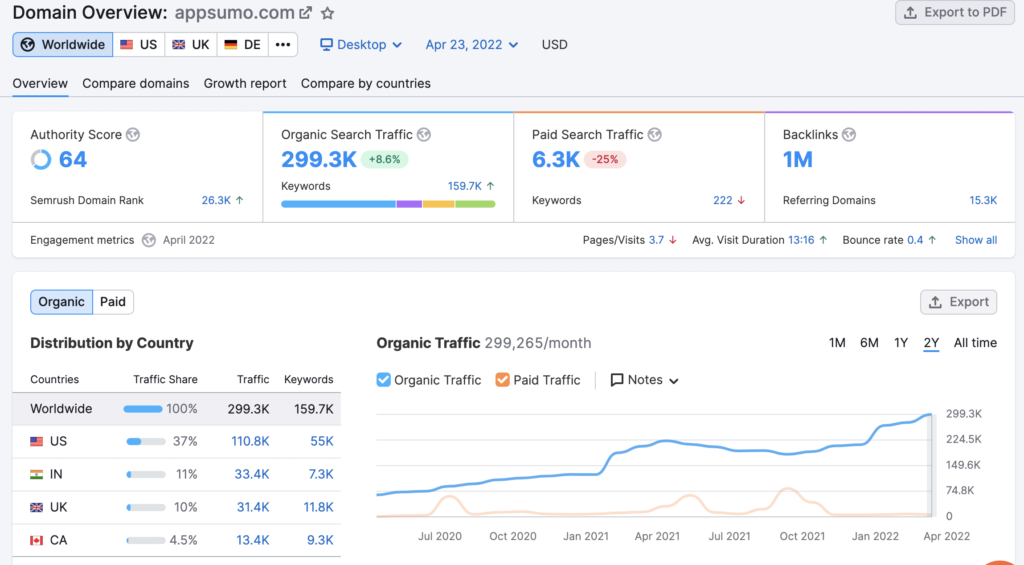
However not all LTDs are equal. Any product that will make the life of this particular target audience will work well. I have seen a lot of good products that are a little bit in a niche – they have not worked well as they don’t appeal to the larger audience here. So please check if you have a good product-market fit otherwise you might be wasting a lot of time and effort on making the deal successful.
2. Why should you do an LTD?
The biggest outcome of our LTD has been that we have been able to go from validating the product to almost reaching Product-Market Fit in a couple of months. I think one should do an LTD as soon as the MVP is made and you are ready to take on the larger market. However, there can be a lot of other reasons for doing an LTD.
Different Objectives of doing an LTD
- Product Validation – You have just launched a product and want to test the waters. If you want to be in front of a lot of users at the same time and gather feedback fast! Move fast and break things.
- New Market Entry – You have been operating in a Non-US market and would want to get to the US. The majority of AppSumo users are based in the US and it’s a very good way to test the waters.
- New User outreach – You have a SAAS product with some traction and would want to increase DAU by reaching out to a new set of users.
- Raising Money – You are looking to raise some money to help you build the next set of features or to start performance marketing
Since we were just launching the product, Our objective of doing the LTD was Product Validation. We wanted to validate our product idea – that too in the US market. Hence Appsumo made the most sense for us. You can also think of doing an LTD purely for the money – however, understand the LTD is basically upfront cash for lifelong liability. So if you have a very good plan to spend that money to grow your business, then only you should do an LTD for Money. There have been cases of folks trying to do this and have generally ended up in disaster. More on this later.
3. The Economics of LTD and how do you price one?
This is where the crazy part begins. How does economics work? How are you supposed to support users for the product lifetime on a 1-time payment? As I said, you can look at LTD as upfront cash against a lifetime Liability. For an LTD buyer, it’s an upfront bargain for Lifetime access to an asset.
To know what you can offer, you need to look at the Cost of Maintaining Users. This typically will depend on the type of product you have.
- If your product is Transactional in nature – eg. a form-based product like a CRM, etc, your server costs will only move linearly against exponential new users. If your product has a transactional level cost associated with it – eg. GPT3 based features or email-sending features then you need to factor in the costs being incurred on every transaction. This also means your costs will go up as the users go up / usage goes up.
- How complex is User Onboarding – Is your product Self Serve or Needs handholding? How complicated are the workflows, can users manage to set up the flow and work themselves? This will broadly decide on how big a support team you will need as users scale up. If the product is self-serve with simple flows, the support team can scale linearly against exponential product usage. Otherwise, you need to factor in larger support costs in the long run.
- Combining these 2 will give you a per month cost to sustain your user. However, there are more factors involved here.
- What is the Average Customer Lifespan – Given any product, there will always be an average Customer Lifespan associated with it. It practically never happens that a product is being used forever by a given user – times change/ tastes changes/ tech changes. You need to know the average number of months users will use the product – this will also be needed to calculate the Life Time Value for users at the time of recurring revenues.
- Another very important factor is the number of LTD buyers who are actually using the product. This number also depends on how you have priced the LTD – If you have a given ridiculous structure – eg. giving everything unlimited forever, you can expect a lot of sales but a very less % of people actually using the product. In our case, since our pricing was on the higher side, and we are trying to make sure people keep coming back to use our product, we do see a 40% usage rate for our LTDs users.
- Multiplying the Average monthly cost with the Average Customer Lifespan and the % usage will give you the total spend on a given Lifetime deal user. Ideally, this should be the amount of money you should ask for!
- You can decide to price the deal to make sure you take enough money from the user to just cover their costs or you can ignore this and price based on the attractiveness of the number for users. However, at least you will know the number you are up against 🙂
3.1 LTD Pricing Strategies
There are different ways you can price the LTD. The core decision of how to price will basically depend on what you are looking to achieve from the LTD.
- If you are looking to validate the product and enter a new market, I will suggest you price the LTD after looking at the long-term picture – if you are not able to generate enough SAAS revenue, will you be able to sustain the users 1-2 years later?
- You should also think if you can get users in via buying the LTD deal and later upsell something to them – though please understand that AppSumo users mostly appreciate One Time payments only and hate being upsold to.
- In our case, we have had <5 people buy subscription plans out of an approx 2000 codes sold so you can imagine the % of people ready to make the switch. And this is after we were offering a 40% perpetual discount on all subscription plans to LTD holders! I spoke to a couple of more SAAS founders who had done an LTD and the numbers are similar to them.
Broadly, you will be expected to provide different stacks to unlock a different set of features or limits. The right way is to have 1 offer code giving certain limits. Then 2/3/4/10 codes can be stacked on top giving some extra features.
A few basic parameters that will help you price:
- Limit by Features: You can decide to offer some features in the base stack and all features in the top stack. This works best if you have some advanced features which might be more useful for agency users. Agency users will typically not mind having the full stack if this is something that will work well for them in the future.
- Increase Feature access non-linearly at multiple stacks: This is a good way to entice users to buy more codes so that they have access to better limits. Have a look at this tool where they have limited access at 1 code and unlimited at 2.
- White Label access: This is a favorite of a lot of agency owners as this helps them make money from your product. A good example will be Cheatlayer where they give white-label access at stacking 10 codes. This costs a cool $1000 to unlock. However if you can show users that they will be able to make much more than their investment, this would be a big win for the users and you!
- Unlimited usage: Though I personally hate this as this is akin to giving the keys to the castle, this does make a lot of sense if your support costs are nil and you are doing the LTD to make money. This is also something that excites the most amount of people and your sales will easily be 3-4X if you are offering unlimited usage forever. However, the flip side is that you will have no leverage to upsell anything later.
3.2 The core conflict of interest
Once an LTD is sold, it’s a perpetual cost/liability for the company and a perpetual asset to the LTD holder. Companies who sell LTD will want users to forget about them once the LTD refund period ends – Users who have bought LTDs will want the company to keep building and creating a superior products.
If you are following the Current LTD Facebook groups, you will know that it has become a very convoluted space to be in. There have been ample incidents of LTDs getting shut after doing a lot of sales and people being unhappy about it. I understand businesses get shut all the time, however, the issue here is some LTDs make a lot of promises about the future roadmap and generate a lot of Buzz and FOMO to sell. When these go down the drain, there is a lot of heartaches and bad blood which takes an impact on the overall community.
There have also been cases where a deal promised the moon and then changed the deal terms later. The community was swift to give 1-star reviews at all places like G2, and Capterra hence screwing the public perception of the company. Be very careful while deciding the deal structure and you won’t be able to change it later without shit hitting the roof 🙂 You might also end up being featured on this 🙂
4. Our learnings:
I have covered a lot of tactical implementation stuff in another blog post we wrote. You can check it out to see how did we plan the LTD. Here are our high-level learnings from the LTD.
- Build a Community – Try to talk to as many users as possible. This might mean reaching out to users on Facebook messenger, sending them emails, and getting on calls. Make a Facebook group and invite users to that. This is very important and helps a lot in the long run. It’s a very good way to increase your user base. Here is how we have seen our DAU evolving
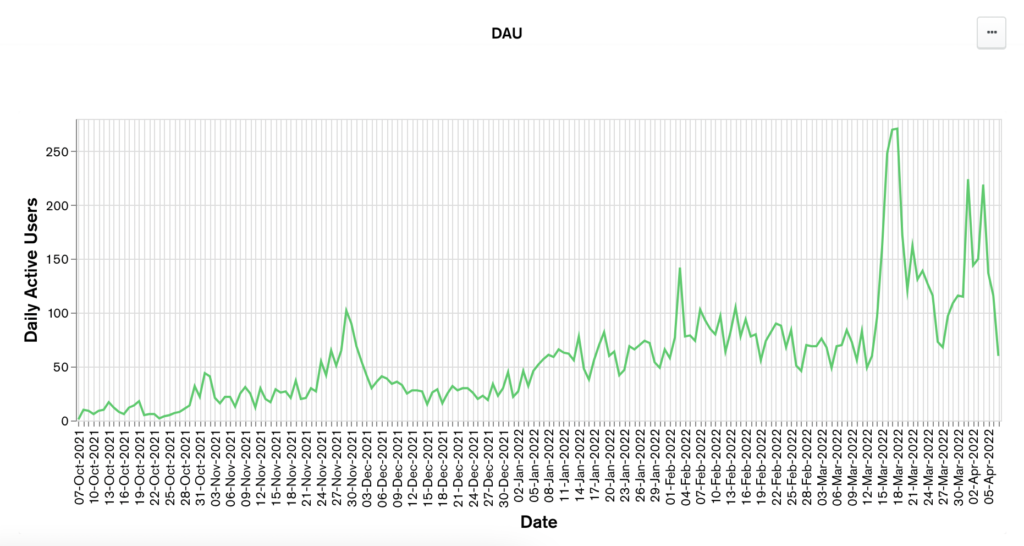
- FOMO Sells – Our LTD was live for almost 6 months. The 2 times when we sold the most were the Black Friday Cyber Monday Sale and the last 2-3 days of the LTD closing date. In our 6 months of existence as an LTD, we sold 60% of our entire codes in a matter of a few days. We did try to generate a lot of buzz/ending FOMO, however, it was the AppSumo Deal Ending timer that cracked it. This is how we sold daily – you will see clear peaks on the BCFM days and the ending days. We are still don’t know what happened to result in the mini-peak in between 🙂
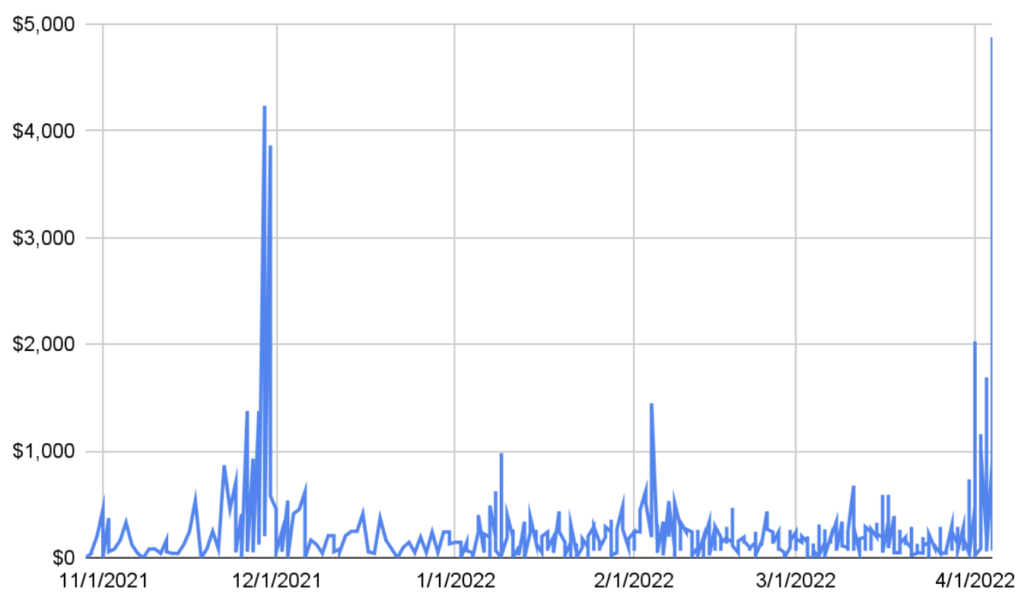
- Think hard about Pricing – Our pricing strategy was very elementary – we were trying to play it safe and priced just by looking at the cost of sustaining users. We just tried to have enough time buffer so that we can grow our MRR and generate enough money in the future to support all users. I am sure that we did not get our pricing right and could have done a better job in defining the limits and the stacks. This might have meant more deals sold or more users onboarded.
- Marketplace vs Plus Exclusive: Our Marketplace deal was going steady in terms of sales and we were not seeing any large uptick in sales. This is when we decided to go for the Plus Exclusive deal. The assumption was that plus exclusive will help us get more exposure on the AppSumo main page and hence sell more. This cost for the Plus Exclusive deal was also higher – 40% of revenue share for us vs the Marketplace deal where we get 70% revenue share. Finally, for us, I think the Plus exclusive deal did not move the needle significantly. We were promised by Appsumo that typical Plus Exclusive deals see 3-4X of sales of the Marketplace deals. The AS plus share for us was 40% of the total sales against the 70% revenue share for the Marketplace deal. Appsumo’s premise was they spend the extra amount on affiliate commissions and also advertising and hence can’t do a larger revenue share. Did not work out for us but maybe you can try this.
- Should you be on Appsumo Select? – If you are looking for more exposure, you should go on to Appsumo Select. It’s very costly for sure – they ask for a 70% rev share and you end up getting only 30% of the total sales. However, you also get the maximum eyeballs as then you are a lot on the Appsumo main page and also get to be part of the emails sent to their large base. It again comes down to what you are looking for – if money is the objective then this might not work out well. Why did we not go on Appsumo Select – We had already spent enough time on Appsumo and were itching to get on the MRR train. We did not have any patience left to wait for Appsumo Select offer and get on for another 1-2 months.
- Stay away from the Affiliates: There are a lot of “Affiliates” in the LTD community – these are people with a good influence who launch “Private-label” LTDs. All of these like to bash Appsumo everywhere and portray themselves as better versions. I think it’s best to stay with Appsumo and maybe explore other deal marketplaces if you want some more exposure – finally, Appsumo has the best and most loyal community with them. The issue with a Private-label LTD is that the Affiliate who is delivering this tends to commit a lot of stuff and the founders then end up holding the towel.
- Show up every day – Make sure to answer the Appsumo questions and respond to reviews within a few hours if possible. Make sure to keep talking about the product updates everywhere – be shameless and post on all LTD groups. People need to know that you are serious about the product and the right way to do this is through your actions!
5. Our 2 Cents for Founders looking to do LTDs
- Your objective needs to be clear – You need to have only 1 objective and then optimize the process around this. For us, we wanted to onboard and take feedback from as many users as possible. We had a book-a-call with the founder Calendly link as part of the base workflow and also made sure we proactively reached out to users via in-product chat, email, Facebook chat, etc. If you looking to do an LTD to make money, focus on creating FOMO and educate users on how can they make money out of your deal.
- Be Honest – You might be surprised in reading this. But as of now, the bar in the LTD community is set so low that you will gain a lot of supporters if you are just being honest and sincere about your product. Be open and transparent in communication, say no to features you know you won’t build, give extended timelines and then deliver anything faster.
- Price looking at the long term – It might be tempting to give an unlimited deal and see a lot of traction. Always ask these questions before you price the deal:
- How are you planning to spend the money?
- Will you be able to convert some of the LTD customers into MRR customers?
- Will you be able to leverage LTD users to spread the word about your product?
- Will you be able to sustain and actively develop the product for at least 3-5years?
- Chase Appsumo for more Visibility- The key is to be present on the Appsumo main page for as long as possible. If you are a Select deal, this happens. Otherwise, I will suggest chasing the good folks at Appsumo to add you to different lists. Generally, they respond 🙂 Make sure your deal reflects the ending timer as this generates FOMO.
- Don’t sell the roadmap – It’s best not to make large promises and just sell what you have. Selling a 6 months roadmap is still fine – you also know what needs to be done immediately and hence close it. Selling a 1-2 year roadmap is not recommended as invariably product priorities might change and the people banking on your promises will feel irritated for sure 🙂
- Collect Reviews – Though Incentivized reviews are against the spirit of the Appsumo community, there is simply no way users are willing to share reviews. We tried sending e-mails and requesting users on chat but the only thing that worked systemically was in-product messaging soliciting reviews and offering some sort of incentive. This worked like a charm and we were able to get 100+ reviews in a few months. I have seen founders take it to a different level by offering a free code for review.
- Keep your Emotions in Check– You will definitely come across some users who will be very demanding, very unreasonable, etc., etc. Yes, We have had our fair share for sure:) Sometimes founders lose it (maybe due to the stress) and decide to give back. This is never a good idea as generally this will be turned into a screenshot and will invite more comments. Whatever happens, just take a deep breath and be professional. Just Apologize and move ahead – you have a large company to build.
I hope all of this makes sense. Do reach out to me at [email protected] /Twitter if you have any questions. I will be happy to address your questions!
6. What’s next for us:
We are very happy with the traction we have got from Appsumo. We are looking to grow our MRR now – we are just shy of $1K and are also launching some Growth hacks to try and leverage our Appsumo user base.


